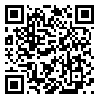Volume 22, Issue 2 (Summer 2021)
jrehab 2021, 22(2): 210-227 |
Back to browse issues page
Download citation:
BibTeX | RIS | EndNote | Medlars | ProCite | Reference Manager | RefWorks
Send citation to:



BibTeX | RIS | EndNote | Medlars | ProCite | Reference Manager | RefWorks
Send citation to:
Abbaszadeh A, Movallali G, Pourmohamadreza-Tajrishi M, Vahedi M. Effect of Baby Triple P or Positive Parenting Program on Mental Health and Mother-child Relationship in Mothers of Hearing-impaired Children. jrehab 2021; 22 (2) :210-227
URL: http://rehabilitationj.uswr.ac.ir/article-1-2838-en.html
URL: http://rehabilitationj.uswr.ac.ir/article-1-2838-en.html
1- Department of Psychology and Exceptional Children Education ,University of Social Welfare and Rehabilitation Sciences, Tehran, Iran., Department of Psychology and Exceptional Children Education, University of Social Welfare and Rehabilitation Sciences, Tehran, Iran
2- Department of Psychology and Exceptional Children Education, Pediatric Neurorehabilitation Research Center, University of Social Welfare and Rehabilitation Sciences, Tehran, Iran. ,drmovallali@gmail.com
3- Department of Psychology and Exceptional Children Education, Pediatric Neurorehabilitation Research Center, University of Social Welfare and Rehabilitation Sciences, Tehran, Iran., Pediatric Neurorehabilitation Research Center, University of Social Welfare and Rehabilitation Sciences, Tehran, Iran.
4- Department of Biostatistics and Epidemiology, Pediatric Neurorehabilitation Research Center, Faculty of Rehabilitation Sciences, University of Social Welfare and Rehabilitation Sciences, Tehran, Iran., University of Social Welfare and Rehabilitation Sciences, Tehran, Iran.
2- Department of Psychology and Exceptional Children Education, Pediatric Neurorehabilitation Research Center, University of Social Welfare and Rehabilitation Sciences, Tehran, Iran. ,
3- Department of Psychology and Exceptional Children Education, Pediatric Neurorehabilitation Research Center, University of Social Welfare and Rehabilitation Sciences, Tehran, Iran., Pediatric Neurorehabilitation Research Center, University of Social Welfare and Rehabilitation Sciences, Tehran, Iran.
4- Department of Biostatistics and Epidemiology, Pediatric Neurorehabilitation Research Center, Faculty of Rehabilitation Sciences, University of Social Welfare and Rehabilitation Sciences, Tehran, Iran., University of Social Welfare and Rehabilitation Sciences, Tehran, Iran.
Abstract: (6653 Views)
Objective: Hearing loss in children can affect the parent-child relationship and the mental health of parents, especially mothers as the children’s primary caregivers. Maternal mental health problems and challenges in the parent-child relationship can affect the rehabilitation process and the future of hearing-impaired children. Thus, the interventions to promote the parent-child relationship and mental health of parents, especially mothers, should be studied. Triple P or positive parenting program is one of these effective interventional programs. Recently, a new intervention called the Baby Triple P parenting program was developed based on the Triple P program. This study investigates the effect of the Baby Triple P positive parenting program on mental health and mother-child relationship in mothers of children with hearing impairment.
Materials & Methods: This research is a quasi-experimental study with a pretest-posttest design using a control group. The participants were 24 mothers under 3 years old children with hearing impairment referred to the centers for families and children with hearing disabilities in Tehran, Iran, in 2019. They were selected using a convenience sampling method and then randomly divided into groups of intervention (n=12) and control (n=12). The intervention group received the Baby Triple P positive parenting program for 13 training 1-h sessions, one session per week. The control group did not receive any intervention. Both groups completed the mother-child relationship evaluation questionnaire and the symptom checklist-90-revised instrument before and after the intervention. The collected data were analyzed by the Mann-Whitney U test and independent sample t-test.
Results: There was no significant difference between the two groups regarding mental health after the intervention (P>0.05). Among four components of the mother-child relationship, the Baby Triple P program had no significant effect on acceptance, overindulgence, and rejection (P>0.05), except on the overprotection component (P<0.05), which was significantly higher in the intervention group.
Conclusion: There is a great need for early interventions for maternal mental health problems and challenges in mother-child relationships for mothers of children with hearing impairment. Although the Baby Triple P is a useful program, it is new for the parents of these children. Considering the unique needs of these children, more studies are needed to enrich the content of this program for the mothers of children with hearing loss to explore its various aspects.
Materials & Methods: This research is a quasi-experimental study with a pretest-posttest design using a control group. The participants were 24 mothers under 3 years old children with hearing impairment referred to the centers for families and children with hearing disabilities in Tehran, Iran, in 2019. They were selected using a convenience sampling method and then randomly divided into groups of intervention (n=12) and control (n=12). The intervention group received the Baby Triple P positive parenting program for 13 training 1-h sessions, one session per week. The control group did not receive any intervention. Both groups completed the mother-child relationship evaluation questionnaire and the symptom checklist-90-revised instrument before and after the intervention. The collected data were analyzed by the Mann-Whitney U test and independent sample t-test.
Results: There was no significant difference between the two groups regarding mental health after the intervention (P>0.05). Among four components of the mother-child relationship, the Baby Triple P program had no significant effect on acceptance, overindulgence, and rejection (P>0.05), except on the overprotection component (P<0.05), which was significantly higher in the intervention group.
Conclusion: There is a great need for early interventions for maternal mental health problems and challenges in mother-child relationships for mothers of children with hearing impairment. Although the Baby Triple P is a useful program, it is new for the parents of these children. Considering the unique needs of these children, more studies are needed to enrich the content of this program for the mothers of children with hearing loss to explore its various aspects.
Type of Study: Original |
Subject:
Exceptional Children Psychology
Received: 27/09/2020 | Accepted: 20/10/2020 | Published: 1/07/2021
Received: 27/09/2020 | Accepted: 20/10/2020 | Published: 1/07/2021
Send email to the article author
| Rights and permissions | |
 |
This work is licensed under a Creative Commons Attribution-NonCommercial 4.0 International License. |








